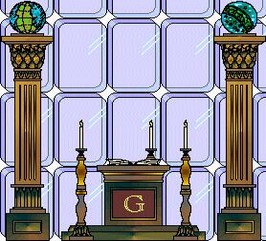Myths About Freemasonry
Is Freemasonry a religion?
No, Freemasonry is not a religion. Masons who treat it as such are mistaken. Freemasonry strongly encourages its members to belong to an established religion, although that is not a requirement for membership (only that a candidate profess a belief in a Supreme Being). Masonry is a fraternal organization that encourages morality and charity
.
What about the term "Worshipful," ?
The term "worshipful" stems from 18th century English usage, when Freemasonry in its present form was being organized. The term has nothing to do with religious worship but is an old synonym for "honorable" or "respected." Judges are called "Worshipful" because of the respect the office elicits. It is the same for the Freemasons.
Is there a conflict between Freemasonry and established religion?
There is nothing in Freemasonry that conflicts with most religions. However, Freemasonry does insist on religious tolerance. Freemasons would be in opposition to intolerances of certain religions who wish to persecute others for their beliefs. Such groups would be both uncomfortable and unwelcome in Masonry.
What about "blood oaths" and hideous penalties of the degrees?
It is true that Masons must take solemn obligations to be faithful to the principles of Masonry. However, the language of these obligations makes it clear that the penalties are not actually inflicted by the Lodge or any body of Masonry but are expressions of how disgraced and contemptible one should feel for violating such an obligation. In some jurisdictions, the candidate is told that the penalties are of "ancient origin and symbolic only."
Masons vs Anti-Masons -- Who is telling the truth ?
The history of Freemasonry is well documented, and its major players include a vast number of contributors to society (see list of Famous Mason)
Among the anti-Masons, there is almost no one of any consequence in history or who has made a significant contribution to the humanities. The anti-Masons operate no charitable groups but engage in fund-raising only to support themselves: They sell books for profit, seek donations to keep their "ministries" operating on television, and contribute nothing to society at large.
All of this is a matter of public record; these facts do not depend on one's ability to determine who is telling the truth. Further, we have the experience of history to teach us what to believe of a group of "anti-" somethings, whether they are anti-Semites, anti-Catholics, or anti-Masons. That historical experience has shown that those who single out a group, especially one different from the majority in society, for hatred are generally not telling the truth about that group, but are seeking to benefit themselves from stirring up the passions of the mob.
In other words, if we knew nothing of the Masons nor of the anti-Masons, it would be difficult to know whom to believe. There are plenty of reasons to choose to believe that Masons are telling the truth in the present context, as opposed to accepting the word of the anti-Masons. The anti-Masons also engage in circular reasoning: They claim that there is a great "Masonic conspiracy" to control the world. Absent any evidence of that, they claim that the very lack of evidence is "proof" of the power of the conspiracy.
Anti-Masons, in discussing some of the more inflammatory allegations about Masonry, such as the worship of satanic or pagan gods, also assert that the vast majority of Masons are totally ignorant of the "real" nature of Masonry, which is revealed only to a few "high" Masons. Yet these anti-Masons insist that they themselves know these hidden secrets better than most of the millions of active members of the Masonic fraternity. How is this possible ?
In other words, there are very good reasons to believe that Masons, rather than anti-Masons are telling the truth about the Fraternity, based on the history of Freemasonry and the known character of those who have been Freemasons.
( In addition to spreading false stories about the nature and intentions of Freemasonry in print media, television and radio programs, and Internet venues, the past few months have seen an escalation of anti-Masonic activity of an active nature on the Internet. Anti-Masons have engaged in several forms of Net abuse, including multiple repeated postings to Usenet of the same material (a dozen or more times), postings to large numbers of Usenet newsgroups, and combinations of these. Within the past week or so, one anti-Mason in Australia with administrator privileges has begun issuing *CANCEL* requests for postings by Freemasons to alt.freemasonry and replacing those messages with forgeries of the originals containing obscenities, incoherencies, and so on. Examination of the full message headers reveals these posts to have originated at telstra.net, near Canberra, and not with the ISPs of the reputed senders. Since anti-Masons uniformly use anonymous posting methods and never appear under their own names or identities, closing down their accounts takes time.
The evidence of those actions can be found at what used to be known as Deja News. Anti-Masons frequently allege that Masons are part of some worldwide criminal conspiracy; when they are caught doing the same, what does it mean for the credibility of their accusations? And why would anyone take the word of a source or group of sources that choose to be anonymous.)
(Source: www.web.mit.edu)
No, the matter of whom to believe is not one which requires hard thought to resolve.
I've read the ritual in an exposť; what is all this strange stuff?
Remember that Masons solemnly pledge to keep the ritual secret. An "exposť" is the product of someone who has broken a promise to his friends and neighbors . Can you really trust that such a person is telling you the truth?
Masonry must be experienced to be understood; reading the ritual does not truly confer the lessons of the degrees, even for those of us who have the real ritual (and not some "exposť"). Masonry is a way of life that involves much more than the ceremonies of the degrees. Knowing a password or secret handshake is not what makes a man a Mason. The essence of Masonry is not something that can be written down.
Is Masonry some kind of global conspiracy?
The simplest answer is "no." But that is not a very satisfying answer for those who have heard many preposterous rumors about Masonry, the "New World Order," the Illuminati, and so on. Let's look at some of the issues that have been raised:
There is no single governing body of Freemasonry in the world. The United Grand Lodge of England (UGLE) is the descendant of the first Grand Lodge formed in 1717, but that gives it no authority over other Grand Lodges, all of which are equal. The UGLE does not even have total authority in Great Britain, for Scotland has its own Grand Lodge.
The top authority in Masonry is always the Grand Master of Masons, not some Grand Commander or other personage associated with the "higher" degrees. The Grand Master of Masons can suspend the General Grand High Priest from all the privileges of Masonry; the GGHP has no such power. Obviously, there is no global organization in Masonry.
The most bizarre thing about conspiracy theories in general is that there is never a clear explanation of what the conspiracy is about, nor how it is carrying out its aims. The alleged Masonic conspiracy stories conform to this. None of the conspiracy theorists ever explains what it is that the Masons want to do with their supposed power.





